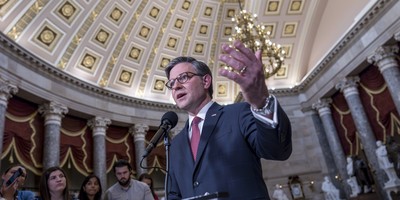OK, here is the latest urgent question for the Supreme Court:
If in 1971 the city of Pleasant Grove, Utah, erected a red granite monument to the Ten Commandments in a public park, does the Constitution of these United States also require them today to grant space for a similar permanent monument to the Seven Aphorisms?
If you are a libertarian, your answer will be: "There shouldn't be public parks."
For the rest of us the first question is going to be: "What the heck are the Seven Aphorisms?"
A short answer: They are the seven divine principles of something called the Summum church. The church believes the Seven Aphorisms were communicated via telepathy from divine beings to the church's founder, Corky Ra, sometime around 1975.
Speaking of the Ten Commandments and the Seven Aphorisms, Su Menu, the president of the Summum church, told The New York Times, "If you look at them side-by-side, they really are saying similar things."
So the Third Commandment says, "Thou shalt not take the name of the Lord thy God in vain." The Third Aphorism reads, "Nothing rests; everything moves; everything vibrates." (Which, if you think about it, really may be a far more fitting motto for the ever-evolving, living, breathing Constitution of today's Supreme Court than the Ten Commandments inscribed in marble on its facade.)
I do not mean to make fun of this lawsuit. There are serious questions at stake. If the question was: Are members of the Summum church free to practice their religion, including on public property -- distribute literature, speak on a soap box in a public park, or even ask that a symbol of their religious holidays be displayed at the same city hall that displays nativity scenes -- my answer would be yes, clearly. If the city was selling bricks inscribed with personal messages in the public park, should members of the Summum church be allowed to memorialize their belief that "Nothing rests" on public property? In my mind, clearly yes.
Recommended
Americans have a basic human right of conscience to seek God however we choose, as well as to reject his existence totally. That certainly extends to members of the Summum church.
But the questions raised by this case are rather different. The Supreme Court has already ruled that including the Ten Commandments amid other displays in public settings does not constitute an establishment of religion. Private individuals clearly cannot have an individual free speech right to erect public monuments.
"The Fraternal Order of Eagles did not erect a momument; they gave a monument to the city, which then decided to place it in a public park. The Summum church has a similar right to give a momument to the city, but the city gets to decide what they want to do with it," says Kevin J. "Seamus" Hasson, president of the Becket Fund for Religious Liberty, which filed an amicus brief in this case. "This isn't a religious liberty case; it's a sneak attack on well-established principles of religious liberty."
Here's my take:
Scarce goods require allocation. Take for example religious holidays and public schools. I believe members of the Summum church should have the right to excuse their own children from public schools for their own religious holidays (within reason). They do not have the right to insist that because public schools are closed for Christmas they should also be closed for a Corky Ra Memorial Day.
For some purposes numbers matter. History matters too. In this sense reality matters, which is why the Ten Commandments are inscribed on the Supreme Court building, but the Seven Aphorisms are not likely to be anytime soon.

























Join the conversation as a VIP Member